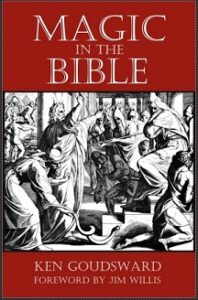This is Faith in Play #47: Magic In The Bible, for October 2021.
In the interest of disclosure I am here commenting on a book by the title Magic In The Bible, by Ken Goudsward, published by Dimensionfold Publishing, who late last year put my recent book Why I Believe on the shelves. Goudsward is the chief executive of that publisher, and when I noticed that he had written this book I expressed an interest in reading it, and he obliged me with a PDF copy. I have reviewed it on Goodreads, and while this might seem to be a review it is more a response to the ideas in the book. It is, after all, October, and our tradition is to cover a magical subject every year in that month.

Goudsward’s thesis is really quite interesting. He examines many of the miracles in the Bible, studying the details of how they are performed, and suggests that in many cases it is not God performing miracles but God’s chosen messengers casting spells which God taught them and directed them to use. Several things Moses does, such as turning the staff into a snake, appear to be accomplished by following a specific ritual, and very much at the whim of Moses himself. That is, Moses had the ability to turn that staff into a snake and back again whenever he wanted to do it; he didn’t have to pray to ask God to make the change each time.
That sounds very like a spell.
You might be uncomfortable with the use of that word to describe the miracles Moses performed—or indeed those of Elijah or Daniel or Joseph or any of God’s people. That, though, is in part cultural: we have been brought up to believe that spells and miracles are different things, and that God’s people don’t use spells. That’s language, though. As Humpty Dumpty said to Alice, a word means what the speaker wants it to mean, no more and no less. In this case, we have Moses performing a specific action as taught to him by God, and releasing and directing supernatural power by that action. In any other context we would call that a spell.
We would also condemn it.
I think it is that part that bothers Goudsward: he would have us recognize that magic is part of the design of the universe, and that God does not condemn it but even directs at least some of His servants to use it. I am inclined to think that there is merit to that, that it is good for us to recognize and to tap supernatural energy in our Christian lives. Goudsward would suggest that all of our spiritual gifts are “magic” in a quite ordinary use of the word, and some of them are “spells,” and that we should embrace them.
If that is his point, I fully agree.
